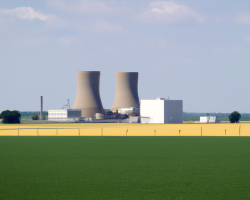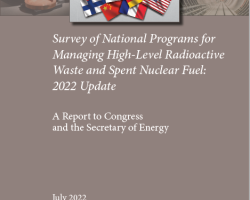Category of Content
Siting Experience Documents Only
Publication Date
Subject Matter
Public Preferences Related to Consent-Based Siting of Radioactive Waste Management Facilities for Storage and Disposal: Analyzing Variations over Time, Events, and Program Designs ?
Public Preferences Related to Consent-Based Siting of Radioactive Waste Management Facilities for Storage and Disposal: Analyzing Variations over Time, Events, and Program Designs ?
Summary of Progress- Modeling Compressible Flow in Microchannels
Summary of Progress- Modeling Compressible Flow in Microchannels
Public Views about Storage and Disposal Options for Spent Nuclear Fuel. Energy and Environment Survey, 2017
Public Views about Storage and Disposal Options for Spent Nuclear Fuel. Energy and Environment Survey, 2017
Summary of PNNL Transportation Activities for FY12 to Support the UFD Program?
Summary of PNNL Transportation Activities for FY12 to Support the UFD Program?
Preliminary Report: Effects of Irradiation and Thermal Exposure on Elastomeric Seals for Cask Transportation and Storage
Preliminary Report: Effects of Irradiation and Thermal Exposure on Elastomeric Seals for Cask Transportation and Storage
Baseline Studies for Ring Compression Testing of High-Burnup Fuel Cladding
Baseline Studies for Ring Compression Testing of High-Burnup Fuel Cladding
Materials and Dimensional Reference Handbook for the Boiling Water Reactor Dry Cask Simulator
Materials and Dimensional Reference Handbook for the Boiling Water Reactor Dry Cask Simulator
Update on the Thermal Hydraulic Investigations of a Horizontal Dry Cask Simulator
Update on the Thermal Hydraulic Investigations of a Horizontal Dry Cask Simulator
Advanced Concepts for Dry Storage Cask Thermal-Hydraulic Testing
Advanced Concepts for Dry Storage Cask Thermal-Hydraulic Testing
Thermal-Hydraulic Results for the Boiling Water Reactor Dry Cask Simulator
Thermal-Hydraulic Results for the Boiling Water Reactor Dry Cask Simulator
Intergenerational Ethical Issues and Communication Related to High-Level Nuclear Waste Repositories
Intergenerational Ethical Issues and Communication Related to High-Level Nuclear Waste Repositories
Purpose of Review: The nuclear power industry started in the 1950s and has now reached a phase of disposing high-level nuclear waste. Since the 1980s, the United Nations has developed a concept of sustainable development and governments have accordingly made ethical commitments to take responsibility towards future generations. The purpose of this review is to examine ethical dilemmas related to high-level nuclear waste disposal in a long-term perspective including potential access to the waste in the future.
Science based responses to social myths on nuclear energy
Science based responses to social myths on nuclear energy
In order to promote a sound basis for considering the role of nuclear in climate change, this review spans the technical topics of social and political debate surrounding nuclear energy with a focus on the objective science of these issues including nuclear waste, accidents and overall risk. Novel aspects include the emergence of nuclear energy as being potentially renewable and the antithesis of Fukushima being an argument for the unacceptable risks associated with the use of nuclear energy.
Survey of National Programs for Managing High-Level Radioactive Waste and Spent Nuclear Fuel: 2022 Update
Survey of National Programs for Managing High-Level Radioactive Waste and Spent Nuclear Fuel: 2022 Update
In October 2009, the U.S. Nuclear Waste Technical Review Board (Board or NWTRB) published Survey of National Programs for Managing High-Level Radioactive Waste and Spent Nuclear Fuel. For each of the 13 national programs studied, the report catalogued 15 institutional arrangements that had been set in place and 15 technical approaches that had been taken to design repository systems for the long-term management of high-activity radioactive waste.


